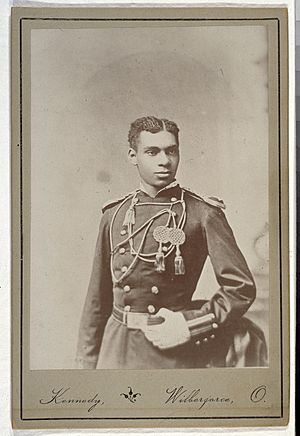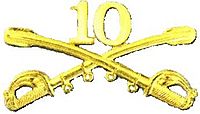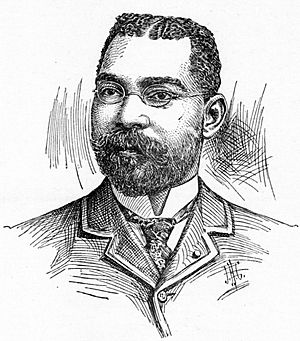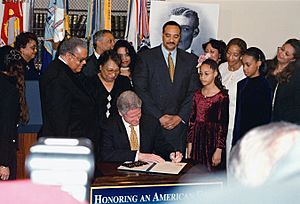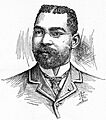Henry Ossian Flipper facts for kids
Quick facts for kids
Henry Ossian Flipper
|
|
|---|---|
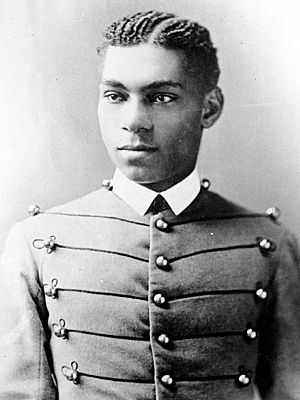
Cadet Henry O. Flipper USMA Class of 1877
|
|
| Born | March 21, 1856 Thomasville, Georgia, U.S. |
| Died | April 26, 1940 (aged 84) Atlanta, Georgia, U.S. |
| Allegiance | |
| Service/ |
|
| Years of service | 1877–1882 |
| Rank | |
| Unit | 10th Cavalry Regiment |
| Battles/wars | Indian Wars |
| Other work | Civil engineer |
Henry Ossian Flipper (March 21, 1856 – April 26, 1940) was an American soldier and engineer. He was born into slavery and later became a very important figure in American history. In 1877, he was the first African American to graduate from the United States Military Academy at West Point. After graduating, he became an officer, a second lieutenant, in the United States Army.
Henry Flipper was also an author. He wrote about science and shared stories from his own life. After becoming an officer, he joined one of the U.S. Army's all-black regiments. These regiments were usually led by white officers. Flipper was assigned to 'A' Troop, led by Captain Nicholas M. Nolan. He became the first non-white officer to lead Buffalo Soldiers of the 10th Cavalry.
Flipper served well and bravely during the Apache Wars and the Victorio Campaign. However, he faced unfair accusations and rumors. Eventually, he had a court-martial (a military trial) and was removed from the U.S. Army.
After leaving the Army, Flipper worked in Mexico and Latin America. He was an assistant to the Secretary of the Interior. He retired in Atlanta in 1931 and passed away in 1940.
In 1994, Flipper's family asked the U.S. military to review his court-martial. The review found that his conviction and punishment were "unduly harsh and unjust." This meant they were unfair and too strict. They recommended that his dismissal be changed to a good conduct discharge. Later, President Bill Clinton officially pardoned Lieutenant Henry O. Flipper on February 19, 1999. This happened 118 years after his original conviction.
Contents
Early Life and Education
Henry Flipper was born into slavery in Thomasville, Georgia. He was the oldest of five brothers. His parents, Isabelle and Festus Flipper, were enslaved by a wealthy slave dealer named Ephraim G. Ponder. His father was a shoemaker and worked with carriages.
Flipper attended Atlanta University during a time called Reconstruction. While he was a freshman, Representative James C. Freeman chose him to attend West Point. Four other black cadets were already there. This small group faced many challenges at the academy. Some white students treated them unfairly.
Despite these difficulties, Flipper worked hard and succeeded. In 1877, he became the first of this group to graduate. He earned a position as a second lieutenant in the U.S. Army cavalry. He was assigned to the 10th Cavalry Regiment. This was one of the four all-black "Buffalo Soldier" regiments in the Army. He became the first black officer to command regular troops in the U.S. Army. Before him, all-black regiments had always been commanded by white officers.
Serving with the 10th Cavalry Regiment
In July 1877, Flipper went to Fort Sill in the Indian Territory. He was supposed to join the 10th Cavalry there. But the 10th Cavalry was actually at Fort Concho. So, Flipper was not immediately assigned to a cavalry troop. Instead, he was given engineering tasks. He helped design a ditch to drain a swamp that had malaria. He also oversaw the building of roads and telegraph lines.
Finally, in October 1877, Flipper received orders to go to Fort Concho in West Texas. He was assigned to 'A' Troop. He made history as the first non-white officer to lead the Buffalo Soldiers of the 10th Cavalry.
Captain Nicholas M. Nolan, the commander of 'A' troop, was assigned to teach Flipper how to be a cavalry officer. Some white officers criticized Nolan for letting Flipper eat dinner in his home, especially because his daughter Kate was there. Nolan defended his actions. He said Flipper was an "officer and a gentleman" just like any other officer.
In August 1878, Captain Nolan married his second wife, Anne Eleanor Dwyer. Anne's sister, Mollie Dwyer, arrived in early 1879. Mollie Dwyer and Flipper became friends and often rode horses together. Nolan was in charge of Fort Elliott. He made Flipper his assistant. Flipper received excellent reviews from his commander. However, rumors and letters started spreading. They hinted at inappropriate behavior between Flipper, who was African American, and Dwyer, who was Caucasian. This was the start of a campaign to damage Flipper's reputation. Over the next few months, he exchanged letters with Mollie.
In the fall of 1879, a Federal Marshal named Norton caused trouble with a county judge. Other county officials tried to help the judge. Norton arrested all of them with his armed men. Norton took the county men to Fort Elliott to be put in the guardhouse. Captain Nolan had to accept the prisoners by law. Nolan talked with the Wheeler County Judge. Then, the telegraph lines were suddenly cut. Nolan decided to act. Flipper gathered the prisoners in the middle of the night. With two soldiers, he set off for another fort in Indian Territory.
Norton captured the entire group and arrested Flipper and one of his soldiers. The other soldier ran back to the fort to report what happened. Norton then headed for Dallas, Texas. Nolan quickly gathered a group of men and chased after them. He caught up to the group and made it clear that no prisoners would be shot while trying to escape. The federal marshal and his prisoners were now under military escort. A federal judge dismissed the arrest warrants. Norton then filed federal charges against the two officers for "interfering with the process of the law." The two officers were quickly tried and found guilty. Both were fined $1,000, which was a huge amount of money back then. Norton was satisfied and left. The federal judge then suspended the payment and dismissed the charges against the two military officers. Army relations in Wheeler County greatly improved.
Nolan guided Flipper during the first part of the Apache Wars in early 1879. Then, Flipper was reassigned to G Troop. Until November 1879, Flipper commanded this unit by himself while his captain was on leave for four months. He received high praise for his work.
In May 1880, Flipper and Nolan met again during the Victorio Campaign. This was the last time they saw each other. Throughout this time, Flipper's military career was made difficult by racism in the military. However, he did have the support of some officers, like Nolan. Many white civilians he met were also impressed by his skills. In late 1880, Flipper was moved to Fort Davis in West Texas. He was assigned as the post quartermaster and commissary officer.
End of Military Career
Colonel William Rufus Shafter took command at Fort Davis in March 1881. He had a reputation for being difficult with officers he disliked. Within days, Flipper was removed from his quartermaster role without a clear reason. Then, Shafter "asked" Flipper to keep the quartermaster's safe in his own room. An "ask" from a superior officer was like an order, so Flipper agreed. In July 1881, Flipper found that over $2,000.00 was missing from the safe. He knew this could be used against him by officers who wanted him out of the army. He tried to hide the missing money. When it was discovered, he lied about it. In August, Shafter arrested him for taking government funds.
News quickly spread about the missing money. Many people felt it was a setup. Soldiers and people from the community quickly raised the money to replace what was missing within four days. Shafter accepted the money. Then, he called for a court-martial on September 17, 1881.
In December 1881, the court-martial found Flipper innocent of the main charge of taking money. However, another charge was added during the trial. He was found guilty of "conduct unbecoming an officer and gentleman." He was sentenced to be "dismissed from the service of the United States." This was a very harsh sentence. In two earlier cases involving white officers who were found guilty of similar issues, neither officer was dismissed or dishonored. Letters exchanged between Mollie Dwyer (Nolan's sister-in-law) and Flipper were used against Flipper. Relationships between white and black people were strictly forbidden by the white officers on the board.
Despite appeals and President Chester A. Arthur denying a lighter sentence, Flipper was removed from the army. This was like a dishonorable discharge for an officer. It happened on June 30, 1882. For the rest of his life, Flipper argued against the charges. He fought to get his officer position back.
Life After the Military
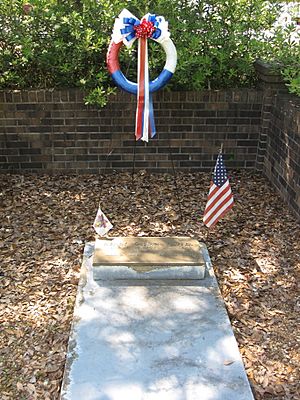
After being dismissed from the Army, Flipper stayed in Texas. He worked as a civil engineer in El Paso. In 1898, he volunteered to serve in the Spanish–American War. However, his requests to get his officer position back were ignored by Congress.
Flipper spent time in Mexico. According to a folklorist named J. Frank Dobie, Flipper tried to find the location of a legendary lost silver mine called Tayopa. When he returned to the United States, he became an adviser to Senator Albert B. Fall on Mexican politics. When Senator Fall became Secretary of the Interior in 1921, he brought Flipper with him to Washington, D.C., to be his assistant.
In 1923, Flipper went to work in Venezuela. He was an engineer in the petroleum industry. He retired in Atlanta in 1931 and passed away in 1940. He was first buried in the family plot at South-View Cemetery. But in February 1978, his remains were moved and reburied in his hometown of Thomasville.
Legacy and Recognition
In 1976, Flipper's family and supporters asked the Army Board for the Correction of Military Records to review his case. The board said they could not overturn his court-martial conviction. However, they concluded that the conviction and punishment were "unduly harsh and unjust." They recommended that Flipper's dismissal be changed to a good conduct discharge. The Army approved this recommendation. They directed the Department of the Army to give Flipper a Certificate of Honorable Discharge, dated June 30, 1882. This replaced his earlier dismissal.
On October 21, 1997, a law firm filed a request for a pardon with the Secretary of the Army on Flipper's behalf. Seven months later, the request was sent to the Department of Justice. Many pardon requests had been rejected in the past if the person had passed away. However, President Bill Clinton pardoned Flipper on February 19, 1999.
After his discharge was changed, a statue of Flipper was unveiled at West Point. Since then, an annual Henry O. Flipper Award has been given to graduating cadets at the academy. This award recognizes cadets who show "leadership, self-discipline, and perseverance in the face of unusual difficulties."
Throughout his life, Flipper wrote many books and articles. He wrote about scientific topics, the history of the Southwest, and his own experiences. In his book The Colored Cadet at West Point (1878), he described his time at the military academy. In Negro Frontiersman: The Western Memoirs of Henry O. Flipper (1963), published after his death, he wrote about his life in Texas and Arizona after leaving the Army.
Images for kids
 | Bessie Coleman |
 | Spann Watson |
 | Jill E. Brown |
 | Sherman W. White |


